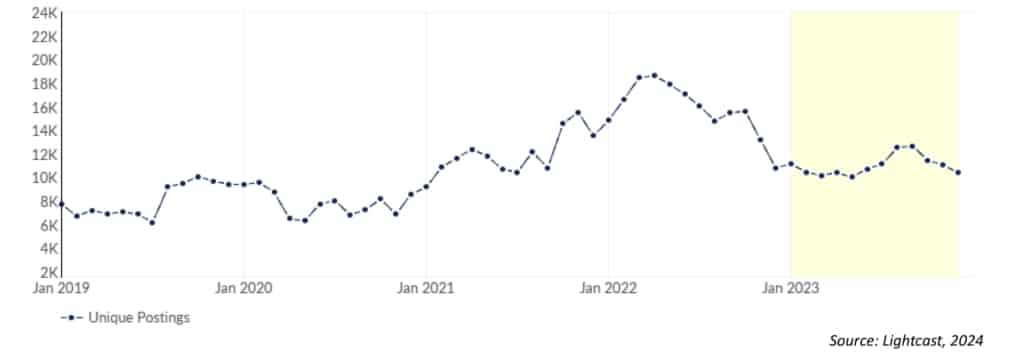Looking forward, the potential implementations of AI remain broad and transformational, with impacts including forecasting enrollment trends, optimizing retention rates, and providing 24/7 support for prospective student inquiries via a chatbot. Individual higher education institutions have ideated and begun to implement creative uses for AI technologies. In mid-2023, it was reported that Harvard will utilize ChatGPT to assist students in an introductory computer science course, primarily for finding bugs in code and answering student questions.3
Societal Impact: Search Trends and Job Postings
Beyond impact on discourse/processes within universities and colleges, AI has become a common topic in far-reaching conversations. Google Trends data evidence this; as shown in the chart below, searches for “AI” (shown by the blue line) were relatively flat through 2022, and then spiked in early-mid 2023. The search trends mirror the launch and widespread public awareness of ChatGPT (searches for which are shown with the red line).
AI-Term Search Frequency Over Time

Trends in Job Postings with “Artificial Intelligence”

| University | Program | Cost |
| UT Austin | MS Artificial Intelligence | $10,000 |
| Duke University | MEng. Artificial Intelligence for Product Innovation | $96,020 |
| Penn State World Campus | MPS in Artificial Intelligence | $34,848 |
| Johns Hopkins University | MS Artificial Intelligence | $37,740 |
| Drexel University | MS Artificial Intelligence and Machine Learning | $62,820 |
Sources:
2Ellucian, 2023, “Higher Education Leaders Eager to Embrace AI and Transform Campus Operations”.
3Hamid & Schisgall, 2023, “CS50 Will Integrate Artificial Intelligence into Course Instruction”, The Harvard Crimson.






